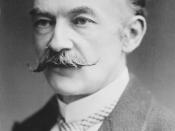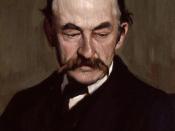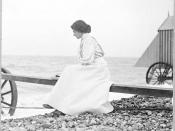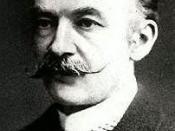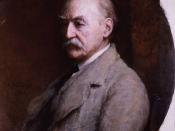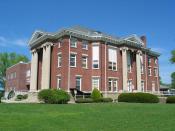In reading this poem there is a distinctive feeling of contrast between nature and men; of pride of life and of leaving or dying. It has a dull emotion to it as if someone was saying it after something so shocking happened he was left feeling very numb. It has been said "The Convergence of the Twain is not a personal lament; it is a philosophic statement. The proud ship, symbol for vain - gloriousness, with no mention of perished men, lies on the sea bottom, a victim of the Immanent Will's rebuke. The pride that built the ship is phrased as human vanity, the pride of life, the opulent." It would than be understandable that Thomas Hardy wrote this poem with a still fresh feeling of grief and numbness as his friend William T Stead was a victim of this tragedy. An his poem was used in aid of the Titanic Disaster Fund as stated in the book " Poetry of Thomas Hardy, A handbook & commentary".
In line one of the poem "In a solitude of the sea" you get a real sense of being painfully alone. In the second line "Deep from human vanity," I get an image of being stranded in the sea or sinking deeply down into it. In the third line "And the Pride of life that planned her, stilly couches she." The way this is put makes me feel as if this was a predetermined act. Something fated as the source " Poetry of Thomas Hardy, A handbook & commentary". "The Spinner of the Years, or Immanent Will, appears to be a godlike being who has caused the crash, and because it seems to assume the disaster was inevitable."
In line four "Steel chambers, late the pyres" it gives it the feel of a floating steel funeral fire. In line five "Of her salamandrine fires," it was believed that salamanders were invulnerable to fires because it is what where they came from. They were an alchemic archetype of transformation. This is the very thing that I believe this line speak of the ships transformation. In line six "Cold currents third, and turn to rhythmic tidal lyres." I take this line as the moment of transformation. Where the cold waters enter the ship and the whistle of the ship blows communicating to the crew the warnings.
In stanza three line seven "Over the mirrors meant" this conveys an image of a cold glassy ocean and white reflective snow and ice. A mirror looking back on itself. In line eight "To glass the opulent" it gives the feeling that even this is adorned as a jewel for the ship. In line nine "The sea worm crawls - grotesque, slimed, dumb, indifferent." This is a strong contrast the men and ship out at the rest of nature that is not so jeweled and beautiful.
In stanza four, line ten "Jewels in joy designed" This contrasts again with the last line of nature not being as refined and beautiful. In line eleven "To ravish the sensuous mind" I see the refined tastes of an affluent person enjoying what all his senses adored and surrounding himself with it. In line twelve "Lie lightless, all their sparkles bleared and black and blind." I see this line as simply stating that for all their beauty, wealth, and power each was lost just the same. It did not matter if they were refined or person or refined of stone it was all sunken to the bottom of the sea.
In stanza five, line thirteen "Dim moon- eyed fishes near" it conveys the sense of sinking into a dark sea or already being down there and looking up and out to a dimming moon as the ship falls farther and farther down. In line fourteen "Gaze at the gilded gear" it contrasts with the darkness all around it and all the ship's light being enveloped with it. In line fifteen "And query: What does this vain gloriousness down here?....." this line gives the poem a very predetermined effect. It is stated in a way the reader can do no other thing but ask himself the question and than think of a tale of punishment from a mighty God. That all the while it was meant to be as if a moral tale.
In stanza six, line sixteen "Well: while was fashioning" It seems to be talking of the boat as it was first beginning dreamt up and made that it was to live up to a great destiny. In line seventeen "This creature of cleaving wing," It brings up an image of the devil who destiny it was to fall from his own pride. In line eighteen "The Immanent Will that stirs and urges everything" with this line it seems Hardy enfolds his retelling into a form of a moral tale and that in the end it is God's will that has been done.
In stanza seven, line nineteen "Prepared a sinister mate" simply saying that the ship was meant to be penetrated by the ice berg. As my second source " A Preface to Hardy by Merryn Williams" agrees by saying "The theme is seems deterministic. As men built the ship the Will "Prepared a sinister mate/ for her." This Will seems a symbol for the process of natural law. It acts like the Greek concept of Fate. The personification implies, to feeling at least, that God, working in ways hidden from human sight, will not be mocked." In line twenty "For her- so gaily great-"this give it the air that the title he speaks of is self proclaimed. In line twenty one "A shape of Ice, for the time far and dissociate." It seems to mean the ice was set aside ready to be formed as it was needed.
In stanza seven, line twenty two "And as the smart ship grew" here is Hardy has decided to tell us the story in the way of a fable. He sets it up as a child's story in its simple phrasing of the line. In line twenty three "In stature, grace, and hue," the ship is personified with its description in much the way you might describe a young man. In line twenty four "In shadowy silent distance grew the Iceberg too." The line personifies the iceberg with sentience and continually capitalizes the Iceberg as if it were an individual.
In stanza ten, line twenty five "Alien they seemed to be:" both the iceberg and the Titanic were both unique of their time. There was no one that could be compared to either one of them I believe the line wishes to express. In line twenty six "No mortal eye could see" it is the invisible design of a god's plan that no one saw coming this line speaks of. In line twenty seven "The intimate welding of their later history," this line taken with line nineteen "Prepared a sinister mate" gives it a sense of an arranged marriage of sorts.
In stanza ten, line twenty eight "Or a sign that they were bent" this line suggests that if not God it may just be that some how they both were attracted to one another. As stated in line twenty nine "By paths coincident" it could have been complete chance and coincidence it happened. In line thirty "On being anon twin halves of one august event," Hardy's choice of the word anon using it as Time after time; now and then: gives this line a queer cause and effect appeal. It subtly suggests again a predetermined fate.
In stanza eleven, line thirty one "Till the Spinner of the Years" Hardy names Fate in the way a Greek would lending it's theme an old mythic appeal. In line thirty two "Said 'Now!' And each one hears," this line suggests to me that the go ahead was given by the Gods or three aspects of Fate herself saying "Now!" and it begins. In line thirty three "And consummation comes, and jars two hemispheres." And it seems to simply state the will shall be done, and it shocked the world with its news.
